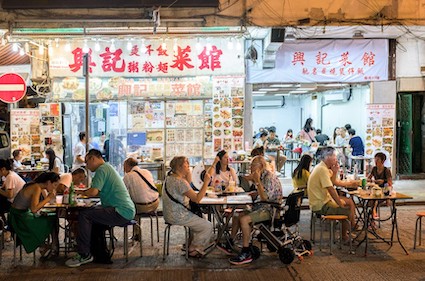Thousands left out of work as hundreds of Hong Kong restaurants close against backdrop of anti-government protests and tourism downturn

(SCMP) – Hundreds of restaurants have been forced to close amid the anti-government protests sweeping Hong Kong, industry insiders have said, putting thousands of people out of work.
Henry Ma, vice-chairman of the Institution of Dining Art, made the claim on Wednesday as the institution and the Hong Kong Retail Management Association urged the government to provide financial relief for businesses, in the form of utility subsidies, and to encourage landlords to reduce rent as the sectors ride out the economic storm the protests have caused.
Ma also said the institution’s members told him they no longer hired freelance workers, while some full-time workers were being forced to unpaid leave.
The vice-chairman said when the market was flourishing in the past, there might have been a new business ready to take the place of one that failed, but that had all changed.
“Now, so far no one was willing to take over [the empty places] based on the current economic environment and the situation,” he said.
According to the Census and Statistics Department, there were about 17,700 organisations providing food and drink services last year, employing roughly 250,000 people.
Still, Simon Wong Ka-wo, president of the Hong Kong Federation of Restaurants and Related Trades, said the downturn was not as serious as in 2003, when the severe acute respiratory syndrome (Sars) outbreak swept through the city.
Wong said more than 1,000 restaurants had closed down in six months during the health crisis, in comparison, from June to September this year, more than 200 restaurants shut their businesses in those four months.
Though not all cases were directly linked to the civil unrest, there had been an indirect impact, he said.
While he said the figure was not alarming yet, he said the situation was serious and was getting worse.
Since the protests began in June, multiple sectors in the city have felt the knock-on effects of the abrupt downturn in tourism.
In August, arrivals to Hong Kong plummeted nearly 40 per cent year on year, and retail sales in the same month plunged a record 23 per cent.
An economic research paper by S&P Global Ratings released on Tuesday said the retail fall was the largest single-month drop since 1981, while September and October look set to be even worse for shopping as the protests continue unabated.
“Lower tourist spending on highly discretionary items such as jewellery drove the decline, while domestic consumption, which skews toward more core shopping such as groceries, was stable,” the S&P report said.
During the seven-day “golden week” holiday from October 1, a traditional business peak, the number of visitors coming to Hong Kong from mainland China was around 672,000 – down more than 55 per cent from the figure recorded over same period last year.
Mainland visitors accounted for about 80 per cent of all Hong Kong’s tourist arrivals before the August downturn.
Annie Tse Yau On-yee, the HKRMA’s chairwoman, said she expected local retail sales to have dropped significantly year on year during the holiday because shopping centres, shops, and the city’s metro system had all closed for long periods of time.
Tse said some private landlords had offered a rent reduction of up to around 30 per cent for a period between two and three months, while Hysan Place, and other shopping centres owned by Swire Properties had also given businesses financial relief.
But other mall operators had not made a similar move, including Link Reit and the MTR Corporation, Tse said.
“Rent and footfall should be positively proportional. When a mall or a place cannot offer such customer flow and driving force, then the rent should be adjusted,” she said.
She added even when there was a robust flow of mainland individual travellers in the past, the rent was already very high.
Tse said officials should offer relief measures on rates and electricity.
“We hope very much that the government can really help and urge landlords to relieve [our burden] on rent,” she said.
Echoing her comments, Ma said he hoped the government could pressure Link Reit to display some social responsibility, and said waiving profit taxes for businesses would help boost their cash flow.
Meanwhile, the Travel Industry Council said the increasingly violent protests had dealt a blow to the tourism industry, and said it regretted the impact on the city’s reputation.
It said while multiple major tourism events, such as the annual Cyclothon and Wine & Dine Festival had been cancelled over safety fears, some travel agencies had also been targeted, and some travel companies had to close because of the protests.
“The cancellations of major events have seriously affected the reputation of the Hong Kong tourism industry and its international image, the sector feels very sorry about it,” it said.
The council urged the government to restore social order so the industry could recover.

